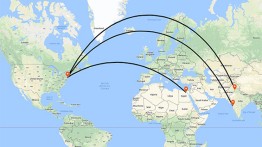Postdocs Around the World
POSTED ON: April 16, 2018

Egypt, Mumbai & the Indo-Pakistan border are the focus of research by 2018's postdoctorate fellows
The role of postdoctorate fellows continues to expand in the Faculty of Humanities and Social Sciences, supporting a more globalized curriculum. This year has seen three new voices, up from the previous two. Nada Ayad, a literary scholar, focuses on Arab women's political texts in an attempt to correct a "betrayed history." Jack Loveridge, a historian, digs around the archives of philanthropic organizations and international agencies to flesh out the story of U.S.-led development efforts in South Asia during the latter half of the twentieth century. Lastly, Ninad Pandit specializes in the modern history of India's cities and social movements. Each of them must teach three courses over the course of a year and present an open lecture that relates to their field. We caught up with them as the academic year winds down.
Ninad Pandit got his undergraduate degree in architecture, though not from The Cooper Union. This evolved into a larger interest in urbanism with a focus on India, where he grew up. Having the B.Arch, he says, "helps me relate to students who are in a professional program. It forces me to think about how to curate conversations in the classroom." Those conversations have included two elective courses: one on colonial cities and the other on Buckminster Fuller. The former looked at, "colonialism as a force of destruction and creativity in Spanish, French and British colonial cities, asking the question, 'Is there such a category as a colonial city?' " The Buckminster Fuller class, taught this Spring, is something of a passion project for Pandit, who sees him as changing the role of the public intellectual in the U.S. who, "speaks to the spirit of collaboration," linking engineering, art and architecture.
Pandit's presentation, this March, related to the research behind his dissertation on industrialization and the emergence of working class politics in Bombay beginning at the turn of the twentieth century. "At the time Bombay was the most industrialized city in colonial India. But the workers were being exploited. The housing and work conditions were terrible. Modeling themselves on unionization in the West, they overcame social taboos to come together as workers and they were very successful at this in the 1920s, becoming a major political and cultural force. But notions of the masculine "worker" became so ritualized and fetishized that by the mid-twentieth century the movement morphs into a xenophobic political party largely alienated from the political and cultural mainstream."
Nada Ayad also takes an interest in the political positions of revolutionaries, but trains her eye on the women of the Arab world, particularly Egypt. "My presentation, back in February, explored the vision of the nation conceptualized in Mona Prince’s self-published 2012 memoir Revolution is My Name as well as the political activist Asmaa Mahfouz’s vlog," Ayad says. "Analyzing representations of domesticity, I argue that they expand domesticity’s political function, while disavowing class and religious biases and blindness. This blindness ultimately undermines the revolution’s attempt at total rupture from the unjust state regime of the past and extends insights about the entanglement of power, oppression and political resistance."
Her talk was a sliver of her larger research on Arab women's political texts through the lens of Egypt's three revolutions in 1919, 1952 and 2011. "I argue that women writers and political activists engage with issues of domesticity not only to incite, participate in, and critique their respective revolutionary moments, but also as a means of imagining a post-revolutionary nation." Her interest began in 2011 during the Arab Spring. "So much of the international media coverage stressed that this was an 'awakening' for women in the Middle East and North Africa region. This very much demonstrated an amnesia regarding Arab women’s political participation. So, I turned to literature to problematize and interrogate this misconception. My research lies at the intersection of art, politics, and history "
Jack Loveridge's research lies at the intersection of economics, history, and agriculture. "The focus of my research is actually looking at international development as a field that emerged, after the Second World War, in South Asia primarily," he says. "Agricultural research done in Mexico funded by the Rockefeller Foundation develops a hearty, high-yield strain of wheat. This gets transferred over to India, in the form of seeds. There, the Ford and Rockefeller foundations take different approaches to leveraging the seed for economic growth. The back end of that is all of these discussions over land reform, who owns what, who owns the seed. So, all these connections are in the literature of the Ford and Rockefeller foundations, but not well-known from a wider historical standpoint. That’s what my dissertation was about."
Loveridge's presentation, delivered in January, took a deep dive into the failures of the efforts of the World Bank and the Ford Foundation to create, from the bottom up, entire agriculturally-focused communities along the Pakistan border designed to, "look like the West." Borders seem to be a particular interest for Loveridge, who grew up in El Paso, Texas with family both north and south of the Rio Grande. He's even teaching a course on migration and borders. He says of the varied students at The Cooper Union: "They have very interesting ideas. I can draw that out to make relationships with my own work. It’s such a nice breath of fresh air to talk to the artists, to the architects, and to the engineers."
In the coming academic year Nada Ayad will become assistant professor of global literature at Fashion Institute of Technology, Jack Loveridge will become a postdoctoral fellow at the Weatherhead Center for International Affairs at Harvard, and Ninad Pandit will return to The Cooper Union as a second-year postdoctorate fellow.




